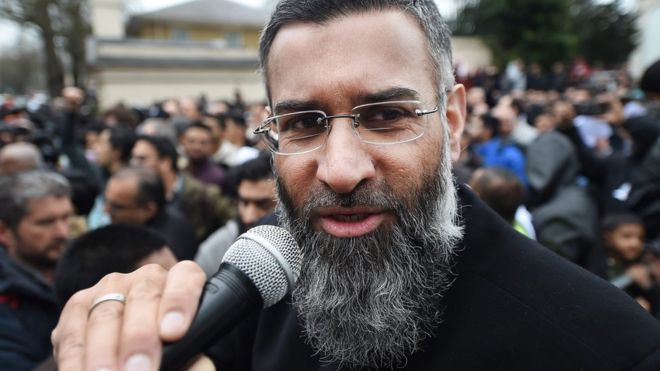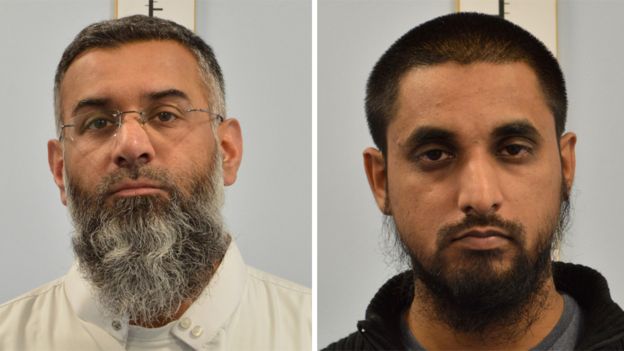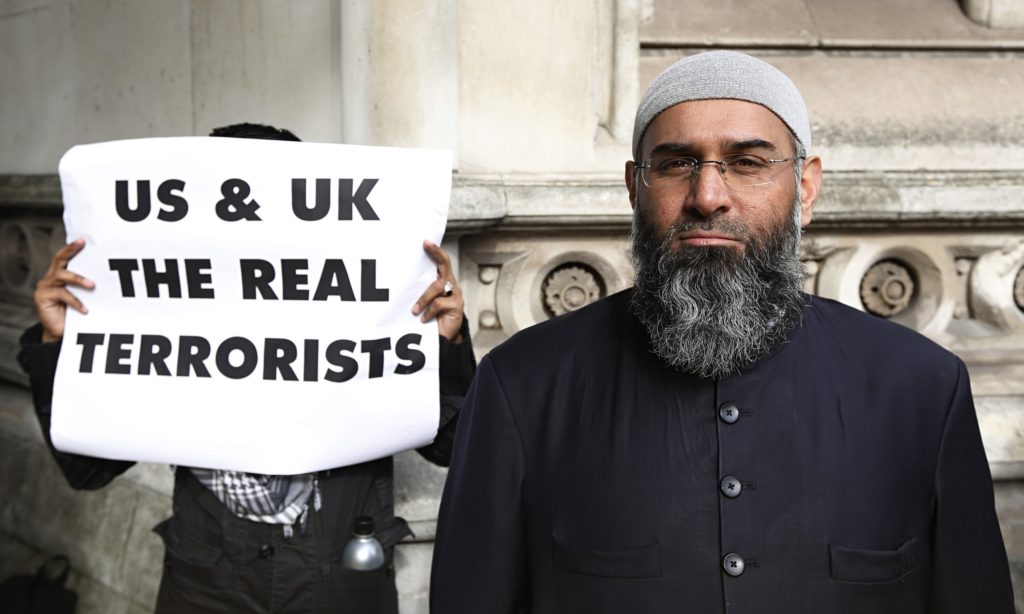Radical preacher Anjem Choudary jailed for five years
BBC
 EPA
EPA_
Radical preacher Anjem Choudary has been jailed for five-and-a-half years for inviting support for the so-called Islamic State group.
The 49-year-old was convicted at the Old Bailey after backing the group in an oath of allegiance published online.
Police say Choudary’s followers carried out attacks in the UK and abroad.
The judge, who described Choudary as calculating and dangerous, passed the same sentence on his confidant Mohammed Mizanur Rahman, 33.
Both men were also sentenced to a notification order lasting 15 years, which requires them to tell police if details such as their address change.
Choudary, of Ilford, east London, and Rahman, from Palmers Green, north London, were convicted last month of inviting support for IS – an offence contrary to section 12 of the Terrorism Act 2000 – between 29 June 2014 and 6 March 2015.
The trial heard the pair also used speeches to urge support for IS, which is also known as Daesh, after it declared a caliphate in the summer of 2014.
Counter-terrorism chiefs blame the preacher and the proscribed organisations which he helped to run, such as al-Muhajiroun, for radicalising young men and women including the killers of soldier Lee Rigby in 2013.
But they said they had been unable to act for many years as Choudary – a former solicitor – had stayed “just within the law”.
Analysis
By Dominic Casciani, BBC home affairs correspondent
As he was sentenced, Choudary’s supporters stood up in the public gallery and shouted: “Allahu Akbar” – Arabic for God is Great. He smiled and disappeared down to the cells.
For 20 years Choudary has been the police’s headache – now he is the prison service’s. He will start time in the high security unit – a prison within a prison – at HMP Belmarsh in south-east London. Only a few of the most dangerous individuals in the country are ever held there at one time – and the priority will be keeping him apart from the impressionable minds whom Mr Justice Holroyde said he did so much to influence.
Whether the prison service will succeed is unclear. Only last month it published a report that raised serious questions about how well the UK manages violent extremists behind bars. So what happens to Choudary from now on may demonstrate whether jails can securely hold people like him and prevent them from doing further harm.
Home Secretary Amber Rudd said: “This is a serious custodial sentence, and it’s a tribute to the work of the police and security services. The country is safer.
“All their evil words and dissent they’ve tried to sow throughout society is over. They’re paying the price and they’re going to jail.”
Sue Hemming, CPS head of counter terrorism said: “Both men were fully aware that Daesh is a proscribed terrorist group responsible for brutal activities and that what they themselves were doing was illegal.
“Those who invite others to support such organisations will be prosecuted and jailed for their crimes.”
‘Gateway to terror’
The head of the Metropolitan Police’s counter terrorism command, Commander Dean Haydon, said the pair caused “frustration for both law enforcement agencies and communities as they spread hate”.
“We have watched Choudary developing a media career as spokesman for the extremists, saying the most distasteful of comments, but without crossing the criminal threshold,” he said.
“This has been a significant prosecution in our fight against terrorism, and we will now be working with communities to ensure that they are not replaced by others spreading hate.”
Kalsoom Bashir from counter-extremism organisation Inspire, said she was relieved the law had caught up with Choudary, saying he has been described as “the gateway to terror”.
“He has enticed those individuals who were on the fringes of society towards supporting violent extremism and giving them, behind closed doors, justification for committing acts of violence in the name of terror – those who heard him then went on to commit those acts of terror.”
Hannah Stuart, research fellow at The Henry Jackson Society – a think tank which aims to combat extremism – said Choudary and Rahman will continue to pose a threat even in prison, due to their “low likelihood of rehabilitation”.
“It is key that their internet access be restricted and that staff are able to identify their efforts to influence communal environments, such as Friday prayers or informal social settings,” she said.

_
In court, Choudary refused to stand up in the dock as his sentencing hearing began.
Passing sentence, the judge, Mr Justice Holroyde, said the pair had “crossed the line between the legitimate expression of your own views and a criminal act”.
“A significant proportion of those listening to your words would be impressionable persons looking to you for guidance on how to act,” he said.
He told Choudary he had failed to condemn “any aspect” of what IS was doing, adding: “In that way you indirectly encouraged violent terrorist activity.”
The judge said that in one of Choudary’s speeches he referred “happily to the prospect of the flag of Islam flying over 10 Downing Street and the White House”, and in another set out his ambitions for Islam to “dominate the whole world”.
Choudary’s supporters included the men who murdered Fusilier Lee Rigby – Michael Adebolajo and Michael Adebowale.
Cartoons protest
Mr Justice Holroyde went on to describe Rahman as a “hothead” while Choudary was more “calculating” and more experienced, adding that both men were dangerous and had shown no remorse.
“You are both mature men and intelligent men who knew throughout exactly what you were doing. You are both fluent and persuasive speakers.”
Choudary’s lawyer, Mark Summers QC, asked the judge to take into account the impact of solitary confinement on his client’s mental welfare when deciding how long he must serve in jail.
However, the judge refused to shorten the sentence and said it was a matter for the Prison Service.
He added that he could not decide sentences based on “speculation” over whether Choudary would be held in solitary confinement “to minimise the risk that persons such as you two will radicalise other prisoners whilst serving your sentences”.
“I do not think it would be right to reduce your sentence because of the possibility that your own behaviour may cause the prison service to deal with you in a particular way,” he said.
Both Choudary and Rahman were previously convicted over a protest march held in London in 2006 over Danish cartoons of the Prophet Mohammed.
Choudary was fined £500 for failing to give notice of a public procession while Rahman was convicted of soliciting murder and jailed for six years.
